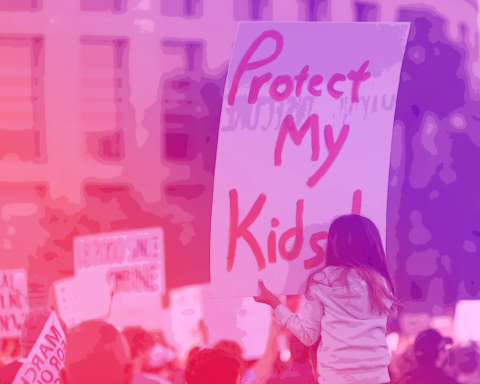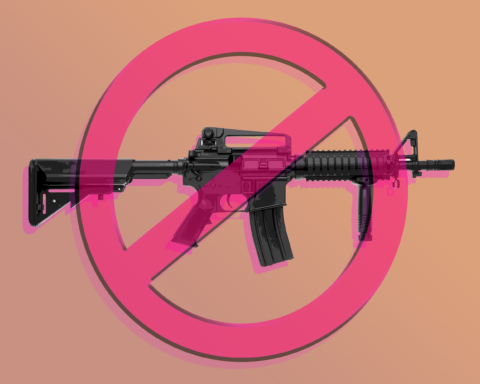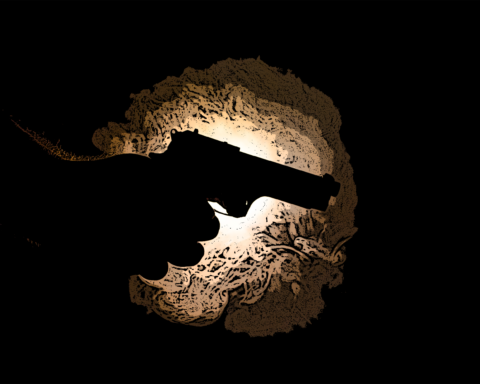The mass shootings in El Paso and Dayton of August 3 and 4, 2019, cannot be allowed to recede into the learned-helplessness of our politics, even if the head of an NRA in disarray can still neutralize a fearful president. Universal background checks should win in both houses of Congress, if ever allowed to the floor. Yet neither of the two main political meta-narratives about mass shootings is exactly Biblical.

The generally Democratic narrative is that crazy easy gun access feeds the violent, racist, and self-destructive elements in our culture. This is an evidence-based approach confirmed by all comparisons with other nations with tougher gun laws and differences among states, where open-carry pro-gun states have more gun murders and suicides. Gun owners are four times more likely than other citizens to die by gun. But this narrative does not uncover the irrational love affair and idolatrous religion that Jim Atwood calls, “gundamentalism.”[i] As a truth-filled text, the Bible would certainly align with accurate data, while also looking at the unquantifiable, beneath the surface.
The generally Republican narrative, like most of their narratives, sees everything through an individualistic lens, so it is easy to blame crazy loners. Mental illness, plus video game overdosing, and maybe just a little racism in some cases, pulls the trigger. This is stigmatization of the mentally ill, who are rarely in fact “crazy” in the colloquial ways I am using the word. To say there are crazy amounts of guns in the US, or that lots of men (and some women) are crazy about their guns, are more accurate statements than correlating the frequency of mass shootings with individual mental illness. The purpose of the Republican narrative is above all to prevent gun regulation. In most cases, isolating each mass shooter from massive gun availability is transparent denial.
And yet, the Dayton gunman shot his own sister in the line at the nightclub, which seems deeply deranged, even if he didn’t target her in aiming. True, 6 of the 9 people he killed were black, and racism often goes with sexism, but his ideology seems to have been more anti-woman and nihilism, to the extent that he had an ideology. Ross Douthat, the conservative NY Times columnist, argues that both shooters and many in our culture, including the president, operate in a spiritual vacuum that is a-social and virtually pre-political. The nihilism diagnosis, of an “inner emptiness” or “spiritual black hole,” may be combined with “malignant narcissism” and grotesque publicity-seeking, but nihilism is really worsened by cultural multiplier effects.

Douthat, as a Christian, picks up on Marianne Williamson’s debate reference to a “dark psychic force” to move toward one Biblical angle: “the possibility that Trump’s zest for demonization can feed a demonic element in the wider culture is something the many religious people who voted for the president should be especially willing to consider.” Walter Wink’s work on the Biblical “principalities and powers” can help illuminate how the demonic element works in our culture, without ignoring the concrete dynamics of gun marketing in US history.[ii]
Let me note that Douthat does not deny pervasive racism particularly evident in the El Paso shooter, but he would limit its explanatory power:
“I would dissent, mildly, from the desire to tell a mostly ideological story in the aftermath of El Paso, and declare war on “white nationalism” — a war the left wants because it has decided that all conservatism can be reduced to white supremacy, and the right wants as a way of rebutting and rejecting that reductionism.” Link to article
The primary Biblical lens with which to view the gun violence debate is the one about selfishness. This selfishness is apparent when a gun-owner is asked, “does your right to have an unlicensed gun outweigh my right to have a life?” Having a gun of any kind, but especially an assault weapon or semi-automatic rifle, can make the owner more fearsome, and it does things to one’s personal identity and relationships. Some extremist white gun owners may even believe their guns are worth more than black or Hispanic peoples’ lives. But the basic question for the majority of Christian gun-owners is: would you submit to more red tape if it would prevent more shedding of red blood?
The primary Biblical lens with which to view the gun violence debate is the one about selfishness. This selfishness is apparent when a gun-owner is asked, “does your right to have an unlicensed gun outweigh my right to have a life?”
Paul’s letter to the Romans raises the question—traditionally phrased—of “who is the weaker brother?” Here is much of the section in Romans 14, which is about living in community:
13 Let us therefore no longer pass judgment on one another, but resolve instead never to put a stumbling block or hindrance in the way of another.[a] 14 I know and am persuaded in the Lord Jesus that nothing is unclean in itself; but it is unclean for anyone who thinks it unclean. 15 If your brother or sister[b] is being injured by what you eat, you are no longer walking in love. Do not let what you eat cause the ruin of one for whom Christ died. 16 So do not let your good be spoken of as evil. 17 For the kingdom of God is not food and drink but righteousness and peace and joy in the Holy Spirit. 18 The one who thus serves Christ is acceptable to God and has human approval. 19 Let us then pursue what makes for peace and for mutual upbuilding. (New Revised Standard Version, NRSV)
It is pretty straightforward to apply this passage to gun ownership. “If your brother or sister is being injured (weakened) by what you shoot, you are no longer walking in love.” This is not about the moralism of not drinking or swearing in front of children, and the passage would not support the claim that a gun is “unclean in itself,” though some weapons of war may be. Nor does this argument demonize gun owners; in fact, it is the reverse, an appeal to the Christian and human empathy of gun owners. It does mean, however, that your Christian witness—or ‘good person’ ethics—are impaired if you cling to gun “freedoms” that are a regular death sentence to innocent people. Even if you challenge the correlation between gun availability and death, and even if you have a right to own anything you can afford, the overarching appeal of scripture is that we are to put our community ahead of ourselves.
So, the shooter—mentally impaired or not—is certainly a “weaker brother,” caused to stumble by easy access to firearms. In fact, brothers—men—or would-be men, are clearly the weaker siblings when it comes to hugging guns to enhance their sense of power. Carrying a gun can (and probably should) add to a person’s hypervigilance and alertness, as well as stress and anxiety. The victims of shootings (mass or individual) are also weaker siblings, as their lives are ruined or damaged, though through no fault of their own.

But the gun manufacturers and owners and their lobby cannot claim to be the weaker siblings even if they cry out desperately at the slightest responsible regulation. They claim to be victims or under threat from a government which has been kept weak and unable to protect ordinary citizens. This is where the Biblical phrase, “stumbling block,” should perhaps be translated back to the Greek, “scandalion.” And part of the scandal is that weak gun laws cause us all to sin in causing thousands of people to die needlessly every year. The gun-huggers or gundamentalists are tearing down society, not protecting it, and effectively they are denying that they are brothers and sisters to the rest of us. More guns will not fill that moral vacuum.
Chris Iosso, Senior Editor of this journal, is Coordinator of the Advisory Committee on Social Witness Policy of the Presbyterian Church (U.S.A.). He served as staff to the Presbyterian study team that produced the policy report, Gun Violence, Gospel Values (2010). A former pastor with an advanced degree in social ethics, he has fired several kinds of gun, including an assault rifle. We note that the Presbyterian Mission Agency will be sending hard copies of that 2010 policy and other resources for discussion to every congregation in the denomination.
[i] See James Atwood, Gundamentalism (Portland, OR: Wipf & Stock, 2014). Jim, a hunter, served on the Gun Violence Study Team of the Advisory Committee on Social Witness Policy which developed the main Presbyterian report: Gun Violence, Gospel Values (2010).
[ii] Wink’s major trilogy bringing the Spirit world of the Hebrew and Christian scriptures to today’s challenges includes Naming the Powers: The Language of Power in the New Testament (1984), Unmasking the Powers: The Invisible Forces That Determine Human Existence (1986), and Engaging the Powers: Discernment and Resistance in a World of Domination (1992). Wink did, however, also look at the more fake mythology about the pervasiveness of guns in US history in reviewing a book on that subject: https://www.religion-online.org/article/guns-r-us/






Unbound Social